|
Hiking
Idaho's Trails
Idaho
trails offer extraordinary scenery and outdoor activities for hikers,
bikers, horseback riders and fishermen, as well as for those who simply love
to be out in the mountains and desert. Hiking in Idaho is
paradise, for the solitude, scenery, superb fishing, and unspoiled nature.
|
|
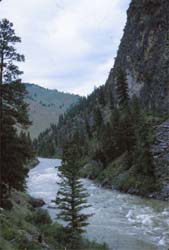
Middle
Fork of the Salmon River, Trails
of the Frank Church - River of No Return Wilderness
|
“A lot of land this Idaho.”
-- Ernest Hemingway once remarked to a friend
Idaho’s
mountains are not only wonderful places to hike, bike, ride a horse or see
wildlife, but the land they cover is immense. More than 20 million acres
of national forest extend over almost 40% of Idaho. The state is
third in forest acreage only to
California and Alaska. Idaho has over 19,000 miles of trails.
There
are seven designated Wilderness Areas in Idaho, including the
largest one in the lower 48 states, the Frank Church-River of No
Return Wilderness at 2.3 mllion acres. It is a wilderness so remote
that elk and deer use its trails more than humans do. Its Middle
Fork and Main Salmon rivers, which are designated wild and scenic
rivers, are two of the most popular in the country for kayaking
and whitewater rafting. Yet away from the rivers, few
people travel the trails and solitude is likely.
|
|
The
Sawtooth National Recreation Area's 756,000 acres are part of the Sawtooth
National Forest's 2.1 million acres. Within this area, often called
the SNRA, the Sawtooth Wilderness is well-known for its
breathtaking jagged peaks and pristine lakes. The SNRA's other
ranges are equally beautiful but unique. Some peaks of the Cecil d. Andrus White Cloud
Wilderness are as white as vanilla ice cream, and the mountains are swirled with gray and pink stripes.
"There
are those who visit the Sawtooth National Recreation Area (SNRA) and leave
convinced they have found the center of the universe.” – The
Sawtooth Society, Protecting, Preserving and Enhancing the Sawtooths
since 1997.
|
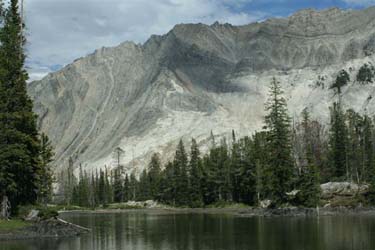
Upper
Ocalkens Lake, White Clouds,
Trails
of the Sawtooth and Boulder-White Cloud Mountains
|
|
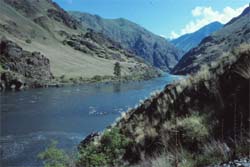
Hell's
Canyon, Trails
of Western Idaho
|
The
rugged Hells Canyon Wilderness holds the black goblin-like peaks of the
Seven Devils and 8,000-foot deep Hells Canyon, the deepest river-cut gorge
in North America. Sharp blocks and iridescent sheets of black lava are
featured in Craters of the Moon National Monument, scene of the youngest
lava flows (2,100 years) in the state, and their recent eruptions range in
age up to 15,000 years. The City of Rocks National Monument and Reserve
and Castle Rocks State Park host several trails among magnificent
towers that offer some of the best rock climbing in the world.
|
|
“There are no tourist
attractions described here, but rather out-of-the-way places and uncrowded
sanctuaries with a special charm and character, places with some elbow room
where you can leave the trail and amble along a ridge or an open hillside, and
where your view, and the thoughts of your mind, are clear and unobstructed”-
Ron Watters (Foreword: Trails of Eastern Idaho)
|
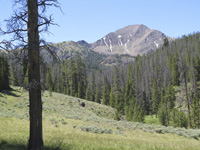 East Pass Creek, Trails
of the Sawtooth and Boulder-White Cloud Mountains East Pass Creek, Trails
of the Sawtooth and Boulder-White Cloud Mountains
|
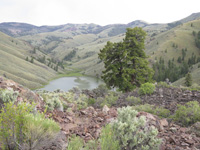
Herd Lake, Trails
of the Sawtooth and Boulder-White Cloud Mountains
|
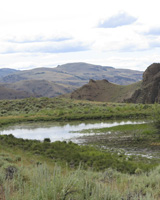
pond near Lake Basin, Trails
of the Sawtooth and Boulder-White Cloud Mountains
|
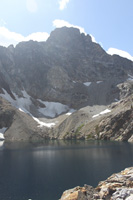
Thompson Cirque Lake, Trails
of the Sawtooth and Boulder-White Cloud Mountains
|
|
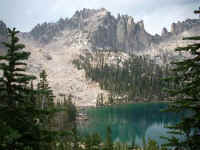
Upper
Baron Lake, Sawtooths, Trails
of the Sawtooth and Boulder-White Cloud Mountains
|
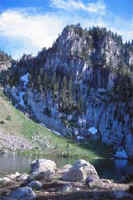
Bloomington
Lake near Bear Lake, Trails
of Eastern Idaho |
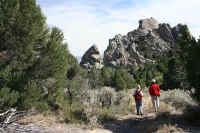
Castle
Rocks State Park, Trails
of Eastern Idaho |
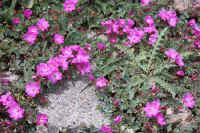
Flowers
near Big Lost Lake, Smoky Mountains, Trails
of Western Idaho |
|
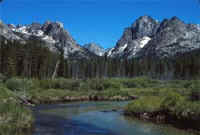
Fishhook
Creek, Trails
of the Sawtooth and Boulder-White Cloud Mountains |
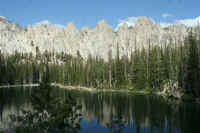
Alpine
Lake on Iron Creek, Trails
of the Sawtooth and Boulder-White Cloud Mountains |
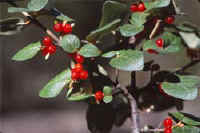
Canadian
Buffaloberries, Wild
Berries of the West
|
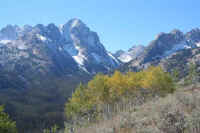
Horstmann
Peak from Alpine Way Trail, Trails
of the Sawtooth and Boulder-White Cloud Mountains
|
|
As you travel
the trails in these areas, be sure to follow the “leave no trace” ethic. Learning about
the fragile ecosystems you travel through will help you understand that
leave no trace is the key to preserving these ecosystems
for all of us to enjoy, now and in the future. The growing season at
mountain elevations is only a few weeks each summer, so any damage takes
hundreds of years to disappear.
Margaret
Fuller's guidebooks give you knowledge that is essential for traveling
Idaho's trails safely and tell you what maps and equipment are
needed. They describe the access roads for the trailheads and give the
length, elevation gain, and difficulty of the trails. They also
emphasize the need for obtaining information on current trail and road
conditions and weather predictions from the local forest, BLM, or park
office before starting out. An experienced
guide from the Idaho
Outfitters and Guides Association can make a multi-day hiking trip much easier by carrying
your gear while you walk or ride.
Idaho
is truly a great state, see more about visiting and exploring Idaho at
Idaho’s Official Travel and Tourism site, www.visitidaho.org
and more about all outdoor recreation opportunities in Idaho at the Idaho
Parks and Recreation official site.
If
Idaho's skiing history holds your interest, Ski
the Great Potato: Idaho Ski Areas, Past and Present by Margaret Fuller,
Doug Fuller and Jerry Painter is an essential. You'll find the
histories of the 21 current Idaho ski areas and of the 72 historical or
"lost" areas in this interesting new book. The book gives the
basic facts about each area and how it started, and it includes little
stories of some of the people who skied at each one. There are stories
of stolen snow plows, an exploding stove, and a young woman who on a
very cold night froze to the seat of a porta-pottie.
“Idaho is dear to us
and we hope our visitors will enjoy their time spent in the state. We
are blessed with many areas where, by following Margaret’s suggestions, one
can be alone for as long as desired in an environment which will rejuvenate,
while causing one to forget foreign travel. Beauty, solitude and the
opportunity for enjoyment abound in Idaho. One only has to be properly
prepared. By following Margaret’s advice, you will experience a new
world unfolding before your eyes with every step. All we ask is that you
use the land, but don’t abuse it. Our resources are finite and there
are many generations to come.” – Cecil d. Andrus (Foreword: Trails
of Western Idaho)
“Happy hiking!”
-- Margaret Fuller
|
All
images © Margaret Fuller - all rights reserved.
Images
may not be copied, downloaded or used in any way without the written
permission of Margaret Fuller |















